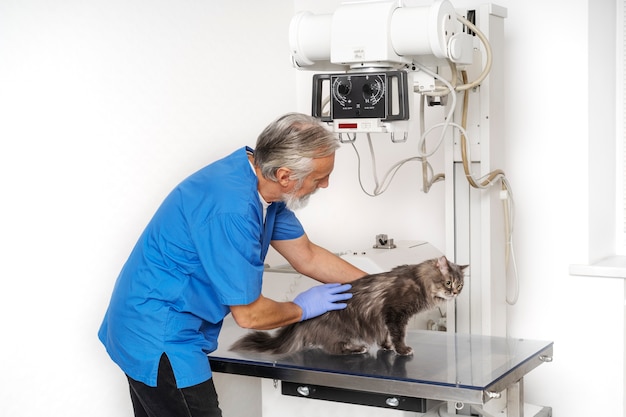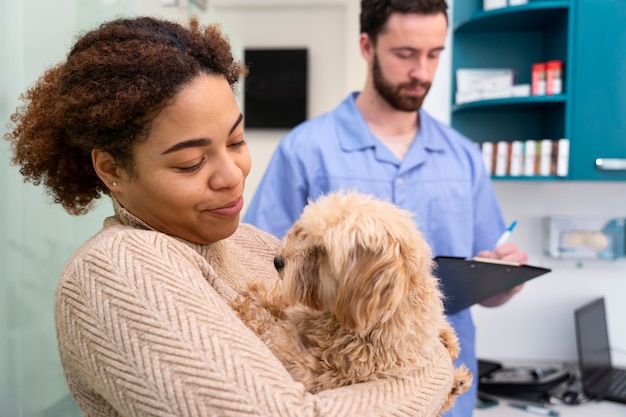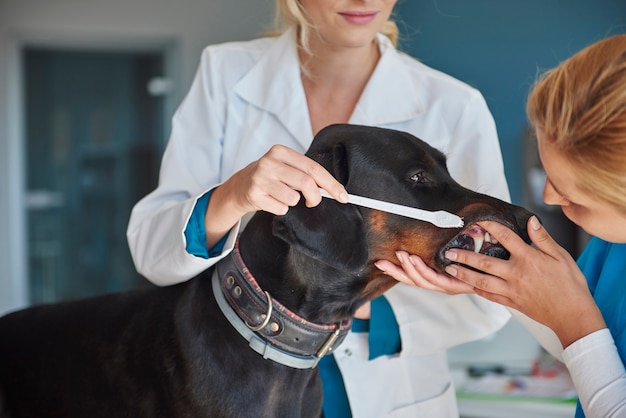Abdominal Ultrasounds for Pets: What to Expect at Liberty Veterinary Clinic

Abdominal Ultrasounds for Pets: What to Expect at Liberty Veterinary Clinic
When your dog or cat is feeling unwell, you want answers as quickly as possible. For many pet owners in Philadelphia and surrounding communities, the uncertainty of an internal health concern can be stressful and overwhelming. Maybe your veterinarian has recommended an abdominal ultrasound for your pet, or perhaps you are searching for a "vet near me" who can offer advanced diagnostic options. At Liberty Veterinary Clinic, located at 8919 Ridge Avenue, Philadelphia, PA 19128, our team of veterinarians is here to guide you every step of the way. Whether your pet needs a routine check-up or more specialized pet diagnostic services in Philadelphia, we deliver compassionate, thorough care in a supportive environment.
In this post, we’ll explain what an abdominal ultrasound for pets involves, why your veterinarian may recommend it, and how this non-invasive tool helps us diagnose a range of internal health issues in dogs and cats. You’ll learn what to expect before, during, and after your pet’s ultrasound appointment, as well as how to recognize symptoms that may signal the need for advanced veterinary diagnostics. If you’re curious about abdominal ultrasounds and how they fit into our diagnostic services, this guide will help you feel more confident and prepared as you support your pet’s health.
Recognizing When Your Pet May Need an Abdominal Ultrasound
Many pet owners wonder when it’s time to consider advanced imaging like an abdominal ultrasound for pets. While routine wellness exams and bloodwork catch many health issues early, there are certain symptoms and scenarios where ultrasound can provide critical insights. Signs that may prompt your veterinarian to recommend an ultrasound include unexplained vomiting or diarrhea, sudden weight loss, changes in appetite, or abdominal swelling. Other red flags are lethargy that lasts more than a day or two, straining or difficulty urinating, and visible discomfort when your pet’s belly is touched.
Sometimes, your pet may show subtler signs, such as mild but persistent digestive upset, increased thirst, or changes in energy levels. For instance, a cat who is eating less and hiding more, or a dog with repeated episodes of soft stool and no obvious cause, might benefit from an ultrasound to look for underlying issues. In some cases, abnormal bloodwork or x-ray results will also prompt your veterinarian to suggest an abdominal ultrasound for a closer look at organs like the liver, kidneys, spleen, bladder, or intestines.
If you notice any of these symptoms in your dog or cat, contacting your trusted veterinary team for advice is always the right first step. Early detection and timely diagnostics can make a significant difference in your pet’s outcome.
Understanding Why Abdominal Ultrasounds Are Used in Veterinary Medicine
Abdominal ultrasound has become an essential part of modern pet diagnostic services in Philadelphia. Unlike traditional x-rays that show dense structures like bones, ultrasound uses sound waves to create real-time images of soft tissues and organs within your pet’s abdomen. This non-invasive, painless technique allows us to examine internal structures in detail without surgery or anesthesia in most cases.
Your veterinarian may recommend an abdominal ultrasound for pets to investigate a variety of concerns. Common reasons include evaluating unexplained abdominal pain, searching for tumors or masses, monitoring known medical conditions, or investigating abnormal bloodwork. Ultrasound is also invaluable in diagnosing urinary tract issues, identifying bladder stones, and assessing liver or kidney disease. In female pets, ultrasound can help diagnose pregnancy or reproductive problems, while in male pets, it can detect prostate abnormalities.
Because ultrasound provides a dynamic view, it allows our veterinarians to see how organs are functioning in real time. This is particularly helpful for detecting fluid buildup, assessing blood flow, or guiding needle biopsies when a tissue sample is needed for further analysis. The ability to observe movement and function gives us a clearer understanding of your pet’s health and guides our next steps in treatment or management.
What Happens During an Abdominal Ultrasound at Liberty Veterinary Clinic
If your veterinarian recommends an abdominal ultrasound for your pet, you may wonder what the procedure involves. At Liberty Veterinary Clinic, our veterinary professionals prioritize your pet’s comfort and safety throughout the entire process. Typically, you’ll schedule an appointment for the ultrasound, and your pet may be asked to fast for several hours beforehand to improve image quality.
When you arrive at our clinic, your pet will be gently positioned on a soft, padded table, usually lying on their back or side. A small area of fur on the abdomen is shaved to allow the ultrasound probe direct contact with the skin. A gel is applied to help the probe glide smoothly, and the veterinarian or trained technician moves the probe across your pet’s belly, carefully examining each organ.
Most pets tolerate the procedure very well, especially with gentle handling and the reassurance of our caring team. Sedation is rarely needed unless your pet is particularly anxious or uncomfortable. The entire process typically takes 20 to 45 minutes, depending on your pet’s needs and the complexity of the case.
After the ultrasound, the veterinarian will review the images and discuss findings with you. Sometimes, additional tests such as bloodwork, urine analysis, or x-rays may be recommended to get a complete picture of your pet’s health. Our goal is to ensure you have clear answers and a thoughtful treatment plan tailored to your pet’s unique situation.
For more details about abdominal ultrasound services at Liberty Veterinary Clinic, we invite you to explore our diagnostic capabilities and approach.
How Abdominal Ultrasounds Guide Treatment and Next Steps
Abdominal ultrasounds are a valuable part of comprehensive pet diagnostic services near me, especially when a pet’s symptoms are vague or when previous tests have not provided clear answers. The information gathered from an ultrasound helps our veterinarians diagnose conditions such as organ inflammation, infections, tumors, cysts, bladder stones, and gastrointestinal obstructions. In some cases, ultrasound may also reveal evidence of internal bleeding or fluid accumulation, which requires immediate management.
Treatment options depend on the underlying diagnosis. For example, if the ultrasound identifies a benign cyst or mild inflammation, your veterinarian may recommend monitoring and supportive care. If a tumor, organ dysfunction, or an obstruction is detected, further diagnostics or surgery may be needed. Ultrasound can also guide minimally invasive procedures, such as needle aspiration or biopsy, to obtain tissue samples for laboratory analysis.
Throughout this process, our veterinary team will keep you informed and involved in every decision. We understand that learning your pet needs further testing or treatment can be stressful, and we are committed to providing clear explanations and compassionate support. Whether your pet requires medication, dietary changes, surgery, or ongoing monitoring, we will develop a plan that addresses your pet’s needs and supports their long-term health.
Preventive Care and Home Support for Pets with Abdominal Concerns
While not all internal health issues can be prevented, there are steps pet owners can take to support their pet’s abdominal health and reduce the risk of serious problems. Regular wellness exams with your veterinarian are essential for early detection and intervention. Maintaining a healthy weight, providing a balanced diet, and ensuring your pet has access to fresh water at all times can help protect organ function and digestive health.
Being attentive to changes in your pet’s behavior, appetite, or bathroom habits is also important. If you notice mild digestive upset, monitor your pet closely and contact your veterinarian if symptoms persist. Avoid giving your pet table scraps, bones, or foods that are known to cause gastrointestinal upset. Keeping toxic substances and household chemicals out of reach is another crucial step in preventing accidental poisoning or ingestion.
At Liberty Veterinary Clinic, we believe that ongoing communication and partnership between pet owners and our veterinary professionals is key to keeping pets healthy. We encourage you to ask questions during your pet’s visits, and to reach out whenever you have concerns about their well-being.
When to Seek Veterinary Care for Abdominal Issues
It can be challenging to know when a digestive upset is minor or when it signals a more serious problem that requires professional attention. You should contact your veterinarian promptly if your pet experiences persistent vomiting or diarrhea, sudden weight loss, abdominal swelling, or signs of pain such as restlessness, whining, or reluctance to move. Difficulty urinating, blood in the stool or urine, or collapse are also urgent warning signs that should never be ignored.
Even if symptoms seem mild, it is always better to err on the side of caution and schedule an appointment with your veterinary team. Early evaluation and diagnostic testing, such as an abdominal ultrasound for pets, can help identify issues before they progress and give your pet the best chance for a positive outcome. If you are searching for veterinary diagnostics in Philadelphia or need guidance about whether your pet’s symptoms warrant an in-person visit, the compassionate team at Liberty Veterinary Clinic is here to help.
Trust Liberty Veterinary Clinic for Advanced Pet Diagnostic Services in Philadelphia
Abdominal ultrasounds are a powerful tool that help us provide answers and peace of mind to pet owners throughout Philadelphia and surrounding communities. By combining advanced imaging with our commitment to personalized care, we ensure your pet receives the best possible support at every stage of their health journey. If you have questions about abdominal ultrasound for pets, or if your pet is showing signs that concern you, we encourage you to reach out to our experienced veterinary team.
To schedule an appointment or learn more about our abdominal ultrasound services for pets, please call (215) 483-1066 or visit us at 8919 Ridge Avenue, Philadelphia, PA 19128. Our team is dedicated to serving as your trusted partner and providing quality veterinary services near me. Whether your pet needs routine care, advanced diagnostics, or ongoing wellness support, you can rely on Liberty Veterinary Clinic for compassionate, comprehensive pet diagnostic services in Philadelphia.
If you are searching for the best veterinarian near me who offers advanced diagnostics and genuine care, look no further than Liberty Veterinary Clinic. We look forward to helping your pet thrive.
This blog is intended for informational purposes only and should not be used as a substitute for professional veterinary advice. If your pet is experiencing medical symptoms or an emergency, please consult your veterinarian promptly or seek immediate veterinary care.


















